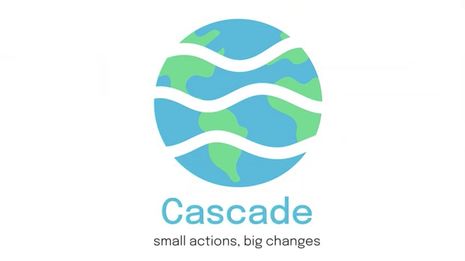Empowering individuals to reduce their ecological footprint: the development of the Cascade app at Cambridge
Varsity’s Interviews editors Yan-Yi Lee and Josef Skrdlik speak with the team behind the Cascade app, revealing how the project, with a focus on individual power, may play an important role in the climate crisis.

It was just another normal day in 2019. Tse Uweja, then a first-year Engineering student, was brushing her teeth when she suddenly had a ‘light bulb moment’ that could potentially have an important role in the global climate crisis.
If everyone were to use bamboo toothbrushes, what impact would that bring? Tse pondered. But then remembering other potentially detrimental impacts that come with bamboo toothbrushes, she plunged deeper into thought: ‘I could probably calculate [the detrimental impacts] myself but it would take maybe four hours to do all of that’, she reminisced. ‘If I need to do this kind of research for every single little decision that impacts the environment, that would take a whole lot of time’. So why not develop an app to do exactly that?
“The central notion of the app is simple: to ‘take the burden of decision-making off the individual [consumer]’.”
This was the casual but impactful event that inspired the blueprint of the Cascade app. Since the genesis of this concept, Tse has convened a passionate team to develop the project – one with a variety of expertise, ranging anywhere from coding to marketing. The central notion of the app is simple: to ‘take the burden of decision-making off the individual [consumer]’, concerning ‘the ripple effect’ as well as ‘the power of individual action’. Simply put, the target market is ‘anyone curious or passionate about sustainability and wants to maximise their positive impact’. To illustrate this, one example of the app’s features is that it may help ‘individuals who are at a supermarket and do not know which product to choose because they don’t know which one is best for the environment’, described Clara, one of the product managers. ‘The app would tell them very straightforwardly the answer they seek’.
Furthermore, the app works around the concept of connectedness. The app will serve as a database for users to record their choices as eco-ethical consumers, which will then exert an influence on the choices of other friends and family who are also on the app. The project was initially named ‘Ripple’ to illustrate the desired ripple effect on the environment, but aspirations for bigger change propelled the team to change the name to ‘Cascade’.
The Cascade app is meant to dispel the myth that since it is mainly industries contributing to pollution, there isn’t much that individual consumers can do other than campaign for change. Contrary to this, the team believes that while the root of climate change does not necessarily trace back to individuals, they ‘do hold a lot of power to effect change’. ‘When we look at how society works, industries change based on consumer choices, and governments as a result of public interest in voting patterns’, they explained. ‘We can change each other, like we change our friends and family. And we hope this will then lead to changes in businesses and governments’.
“When we look at how society works, industries change based on consumer choices, and governments as a result of public interest in voting patterns ... We can change each other, like we change our friends and family.”
Taking into consideration the deeper meaning of ‘holistic sustainability’ with reference to the UN’s Sustainable Development Goals, the team has integrated several features into the app’s blueprint. The app provides, for example, crucial information for recycling clothes and suggests greener ways to travel within and beyond the country. Beyond the pure notion of climate-friendliness and carbon footprint measurement, they mentioned the significance of two other metrics in the app: biodiversity and ethics. These concern whether ‘the brand of a product is ethical towards its workers and animals’ and furthermore, ‘its brand identity’, that is, the other industries that the brand supports. ‘We believe greenhouse gases (GHGs) only tell one aspect of the sustainability story’, Tse mentioned. ‘You also need to factor in other environmental, social and economic indicators’.
In addition to rigorous design planning, the team has considered their overall competitiveness as an app. This began with them initiating conversations with climate change and behavioural scientists, who all saw potential in the entrepreneurial idea. Their unique competitive advantage is threefold. Firstly, it integrates behavioural insights to provide a user-centric experience. Secondly, it aims to take a holistic perspective, focusing on not only carbon footprint but also factors of sustainability. Thirdly, there is the aforementioned factor of connectedness between friends and family. All in all, the app is striving to go the extra mile: ‘we tell you to switch and we give you the top five, based on cost, convenience, ethics, biodiversity, carbon footprint ...’ In a sense, this app ‘sorts all personal excuses’ when consumers do their shopping. They also added that ‘the issue sometimes is the amount of [climate change] information that is out there. A bit overwhelming’. The role of Cascade, hence, is ‘to streamline it’.
However, the Cascade team is also aware that as with other social movements, the environmental justice movement that they are striving to build might not be joined by everyone. As such, they believe that it’s ‘better to start with a targeted user base’ and then ‘create the cascade effect’.
Another issue they have been considering pertains to Cascade’s role in the long term fight for sustainability. Some may argue that top-down systemic changes – for instance, taxations of the most polluting industries – may be more powerful than attempting to change consumerism habits on a bottom-up, individual level. Cascade believes that different people have their roles to play. ‘Systemic change is good, but that still needs to be coupled with individual actions’. As a team of engineers, philosophers, marketers, and designers, the Cascade developers aren’t here for political campaigning against capitalism, but mainly to manifest the collective power of individual consumers.
For now, the team is working on the minimal viable product and hoping to engage in more beta testing as soon as possible. More broadly, they are planning a future roadmap to attract more people to join, considering also the inclusion of internship programmes. With things gradually setting in the horizon, there is the possibility for the app to be launched as early as late 2022.
For more information on the Cascade app, please visit the Cascade website, follow their social media and sign up to their mailing list by following this link: linktr.ee/cascadeapp.
Special thanks to Tse Uweja, Kazal Oshodi, Clara Schindler, and Hana Khan.
 News / Newnham postgrads referred to homeless charities as College runs out of rooms31 July 2025
News / Newnham postgrads referred to homeless charities as College runs out of rooms31 July 2025 Arts / William Morris’ little-known labours in Cambridge25 July 2025
Arts / William Morris’ little-known labours in Cambridge25 July 2025 Lifestyle / Break-ups in the bubble31 July 2025
Lifestyle / Break-ups in the bubble31 July 2025 News / Lucy Cav secures £47m loan to expand student accommodation30 July 2025
News / Lucy Cav secures £47m loan to expand student accommodation30 July 2025 Theatre / One year, many stages: the fresher actors behind Cambridge theatre31 July 2025
Theatre / One year, many stages: the fresher actors behind Cambridge theatre31 July 2025









